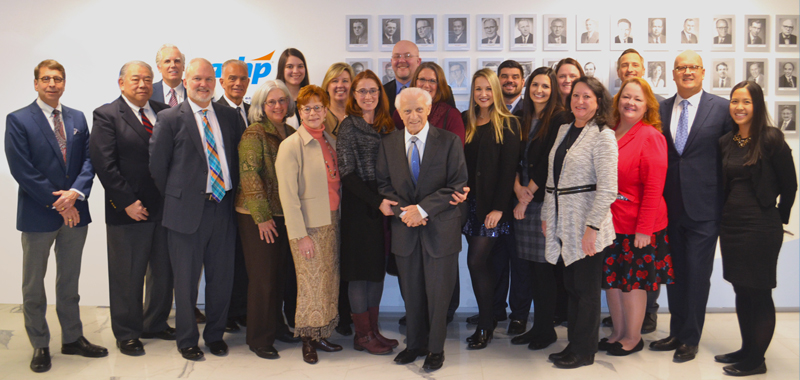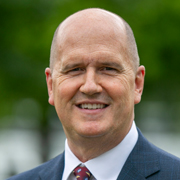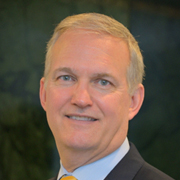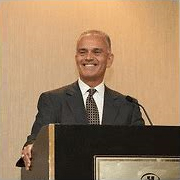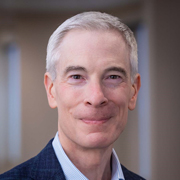
Mark Hayes, BSPharm, JD
Senior Vice President, Policy and Advocacy
Ascension
ASHP Executive Resident 1988 - 1989
Introduction
In the complex world of health policy and law, few professionals carry the dual distinction of being both a pharmacist and a lawyer. Mark Hayes is one such individual whose career trajectory encapsulates over two decades of influential work in health care legislation and policymaking. Hayes served as ASHP Executive Resident from 1988 to 1989, during which he had experience under the mentorship of Joe Oddis and Mary Jo Reilly, who launched his career in health law and policy in Washington. His journey is a testament to personal achievement and reflects the broader U.S. health care policy shifts over the years.
Professional Journey
Hayes's career is notably marked by his tenure on the staff of four U.S. Senators, a role that placed him at the heart of health care reform discussions in the country. His most significant contribution came as the Health Policy Director and Chief Health Counsel for the Senate Finance Committee under Senator Chuck Grassley. Here, Hayes's expertise was instrumental in drafting and negotiating critical health care provisions within landmark legislation, including the Medicare Part D Prescription Drug Benefit and Medicare Advantage programs in the Medicare Modernization Act and an influential role in the creation of the Affordable Care Act. These pieces of legislation were pivotal, reshaping the landscape of Medicare, Medicaid, and the broader health care system in the United States.
In 2015, Hayes embarked on a new venture, founding Hayes Health Policy Strategies PLLC. He established this firm to provide strategic legislative and regulatory counsel to diverse health care clients. His work involves a deep dive into the legislative framework, where he crafted policy options and advocated for his clients' interests before the halls of Congress and regulatory bodies. This role demands a thorough understanding of health policy and a nuanced appreciation of the legislative process, the communication process of public affairs, and the political dynamics of Capitol Hill.
Before founding his firm, Hayes was a shareholder at Greenberg Traurig LLP, where he represented a broad spectrum of clients in the health care sector. His responsibilities ranged from guiding hospital systems through the regulatory aftermath of the Affordable Care Act to advising trade associations on policy and legal strategy. His experience at Greenberg Traurig underscored his ability to navigate the complex regulatory environment post-ACA, providing clients with insights and strategies to adapt to the new health care paradigm.
His efforts in community health initiatives further distinguish Hayes's career. While serving as Vice President of Saint Louis 2004, he was instrumental in spearheading initiatives to revitalize the St. Louis region, focusing on enhancing health outcomes and reducing disparities. His creation of the Access to Health Partnership, which evolved into the Saint Louis Regional Health Commission, underscored his dedication to enhancing healthcare access and outcomes. His pivotal role in obtaining federal funds for improving the streetscape of Washington Avenue in Downtown St. Louis played a crucial part in its revival. This turnaround transformed a zone plagued by years of urban decay into one of St. Louis's most sought-after neighborhoods. Hayes also led the effort to mobilize a strategic coalition of business leaders, top elected officials, and community influencers to advocate in Congress, securing $18.9 million in federal funds for priority initiatives to contribute to the St. Louis revitalization effort. His work in this area demonstrates a commitment to shaping policy at the national level and driving change at the community level, addressing the social determinants of health, and improving the lives of individuals.
Hayes also serves in a leadership position for the Saint James United Methodist Church, where he served for ten years as the Chair of the Church Council, the church’s leadership team. During this period, Saint James UMC partnered with the District Office for the Northern Virginia District to combine their adjoining properties. With Hayes’s leadership and the partnership with Pastor James Henry, Saint James embarked on this transformative journey in 2013, selling its three-acre property in the Beauregard neighborhood in 2015 to AHC, a nonprofit developer. This collaboration led to the creation of St. James Plaza, a 93-unit affordable housing complex that has quickly become a home for many. While the church transitioned to a smaller, renovated building nearby, this endeavor revitalized the community. It also strengthened the congregation, drawing in new members inspired by the church's commitment to its mission. Hayes continues to serve Saint James UMC today as the staff parish relations committee chair.
Since February of 2016, Mark has served Ascension where he is currently the senior vice president of policy and advocacy. Ascension is one of the nation’s leading non-profit and Catholic health systems, with a mission of delivering compassionate, personalized care to all, with particular attention to serving those living in poverty and the most vulnerable. His responsibilities include shaping federal and state policy strategies to advance Ascension's Strategic Plan. His leadership role focuses on external advocacy, engaging with federal and state policymakers to align with Ascension's goals. He collaborates with internal leaders as the organization navigates the immediate and long-term political and policy landscape. By focusing on Ascension's Mission, Vision, and Values, he ensures that policy development and advocacy efforts are consistent and reflect the organization's priorities, thereby steering Ascension through the complex healthcare policy environment with a clear and focused approach.
Fellowship Reflections
ASHP’s Executive Residency laid the foundation for Hayes, and his educational background as a pharmacist, coupled with his legal acumen, equips him with a unique lens through which to view health policy. His Bachelor of Science in Pharmacy from the University of Missouri-Kansas City and Juris Doctor from American University Washington College of Law have provided him with the multidisciplinary background necessary to navigate the complex intersection of health care, law, politics, and policy.
Hayes recalls many vital learnings and experiences from the ASHP Executive Residency. The opportunity to be mentored by Joe Oddis was a once-in-a-lifetime experience. Joe taught so much through the example he set for those around him. There were many one-on-one sessions about leadership and management style and discussions about the profession's opportunities and challenges. It was apparent he cared personally for everyone at ASHP, which came through in how he was always present with whomever he was with. Anyone in ASHP could join him in the conference room at the end of the day to discuss issues or unpack a particular challenge facing the association. Joe was proud of what ASHP had achieved, and he would tell stories of the early days when ASHP was just forming and was working out of the basement at APhA. Joe always listened carefully and sought ways to lead ASHP to further success. Joe was also a leader internationally. His example set a vital lesson about how the profession benefits from engagement worldwide, looking for ways to shape the profession, and learning from leaders in other countries. He taught his leadership style through his example of treating everyone with respect, offering feedback by asking insightful questions, and leading the other person to explore new ideas and ways to overcome challenges.
Mary Jo was also an essential influence and mentor for the residents. Mary Jo was the COO and number two at ASHP. She ensured things got done, and her example demonstrated the value of hard work. There were many sessions with Mary Jo discussing the operational ins and outs of running an association and how to meet the daily challenges effectively. Mary Jo was the moving force responsible for ensuring everything ran smoothly– ensuring the organization stayed on track and the guiding hand behind everything ASHP did. Her caring and consistent guidance throughout the residency was essential to the program's lessons and success.
Advice for Young Professionals
The ASHP Executive Residency was foundational for Hayes. The experience provided crucial leadership, management, and hard work lessons that launched his career in Washington. As the health care landscape continues to evolve, professionals like Mark Hayes play a critical role in shaping the policies that will define the future of health care in America. His career is an example for aspiring health policy professionals, illustrating the impact one can have through a dedication to public service, a commitment to health care reform, and an unwavering belief in the power of policy to transform lives.
